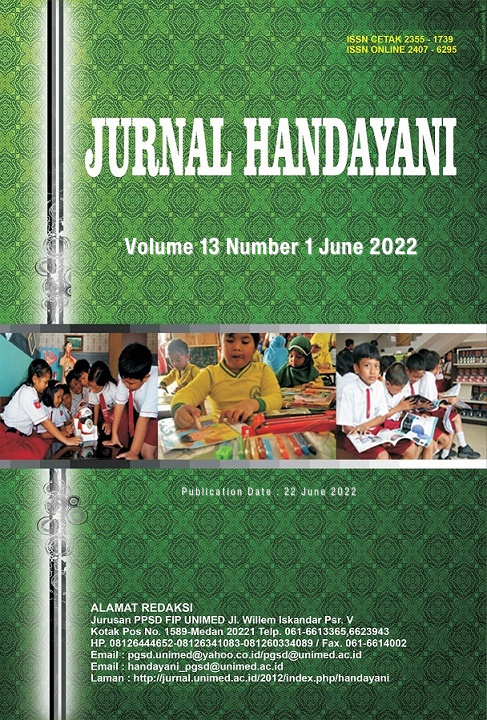Abstract
Abstrak Berdasarkan observasi awal di SD 38 Palembang yang dilakukan oleh peneliti ditemukannya masalah, yaitu didalam menjelaskan materi guru hanya terpaku dalam buku paket atau buku siswa sehinga pemahaman siswa itu kurang terhadap pembelajaran materi IPA hal tersebut dapat dilihat dari rendahnya nilai siswa. Pembelajaran IPA ini sangat dibutuhkan oleh pemateri yang luas sehingga pemahaman siswa kurang terhadap pembelajaran materi IPA, hal tersebut dapat dilihat dari rendahnya nilai siswa. Metode penelitian ini menggunakan metode research and development dengan batas penelitian penilaian ahli dan praktikalitas. Penilaian ahli dilakukan pada ahli media, bahasa, dan materi, sedangkan praktikalitas dengan guru dan siswa. Teknik pengumpulan data menggunakan dokumentasi dan angket, sedangkan teknik analisis data menggunakan persentase. Hasil dari dari tahapan pengembangan adalah menghasilkan produk modul IPA materi sumber energi berbasis Contextual Teaching and Learning (CTL) pada materi sumber energi kelas IV SD. Hasil penilaian para ahli menunjukkan bahwa modul IPA materi sumber energi berbasis Contextual Teaching and Learning (CTL) dengan persentase sebesar 88,58%. Dengan demikian, dapat disimpulkan bahwa pengembangan modul IPA materi sumber energi berbasis Contextual Teaching and Learning (CTL) pada materi sumber energi kelas IV SD termasuk dalam kategori sangat valid. Dari hasil praktisi yaitu guru dan siswa diperoleh persentase sebesar 97,39%. Dengan demikian, dapat disimpulkan bahwa kepraktisan modul IPA materi sumber energi berbasis Contextual Teaching and Learning (CTL) pada pembelajaran kelas IV Sekolah Dasar termasuk dalam kategori sangat layak.Kata Kunci: modul, sumber energi berbasis, contextual teaching and learning (CTL)AbstractBased on initial observations at SD 38 Palembang conducted by researchers, a problem was found, namely in explaining the material the teacher was only glued to the textbook or student book so that students' understanding of learning science material was lacking, it could be seen from the low grades of students. Science learning is really needed by a broad range of speakers so that students' understanding of learning science material is lacking, it can be seen from the low grades of students. This research method uses research and development methods with the limits of expert judgment and practicality. Expert assessment is carried out on media, language, and material experts, while practicality is carried out with teachers and students. Data collection techniques use documentation and questionnaires, while data analysis techniques use percentages. The result of the development stage is to produce a science module product for energy source materials based on Contextual Teaching and Learning (CTL) on energy source materials for class IV SD. The results of the expert's assessment showed that the science module for energy source materials was based on Contextual Teaching and Learning (CTL) with a percentage of 88.58%. Thus, it can be concluded that the development of a science module on energy source materials based on Contextual Teaching and Learning (CTL) on energy source materials for class IV SD is included in the very valid category. From the results of practitioners, namely teachers and students, a percentage of 97.39% was obtained. Thus, it can be concluded that the practicality of the science module on energy source material based on Contextual Teaching and Learning (CTL) in grade IV elementary school learning is included in the very feasible category.Keywords: module, energy source based, contextual teaching and learning (CTL)


